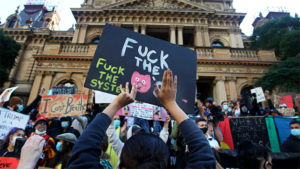Home » Commentary » Opinion » Identity politics is a threat to societies
· Spectator
 Identity politics has been weaponised to sow division across the Western world.
Identity politics has been weaponised to sow division across the Western world.
Global outrage over the killing of George Floyd by a white policeman in America last year has been harnessed by activist groups such as Black Lives Matter to support demands for social and political upheaval that go way beyond making racial equality a reality.
Identity politics is not just about countering the long record of oppression that black people in America have experienced from the white majority who first enslaved them, then after emancipation denied them basic civil rights, and who continue to impose injustices of varying degrees of severity on them even now. It, and especially its weapon of seeking to close down freedom of expression, is now being harnessed by minority groups of all descriptions around the world, and sometimes with far less cause than that of those who straightforwardly protest that police officers should not kill their black fellow citizens — even those they have a legitimate reason to arrest — with impunity.
This has led to the weaponisation of identity politics across much of the Western world, causing rancour, division and distrust in societies with white majorities and ethnic minorities.
When identity politics is used as weapon, society becomes vulnerable to its deployment by those whose agenda is to undermine interests they deem to have power (whether political, social or financial) that is denied to the minority and deemed to be used against their interests. Any attempt by political, social or financial elites to play identity politics would attract either ridicule or hostility: these are not sections of society that naturally attract the public compassion or sympathy that elevates a cause to a point where orthodox political power has to recognise its significance. These powerful elites are precisely those that minorities, and those who purport to speak for minorities, claim have been stacking the odds against them for generations, even centuries.
Much of the power of identity politics is to make normally rational people who consider themselves part of an oppressor majority behave in an irrational and self-hating way.
They do this in order to distance themselves from appalling behaviour that it would never occur to them to engage in, but also for fear of being seen not to conform and thereby attract public condemnation.
The latter is in especially plentiful supply thanks to social media, which itself generally bypasses rationalism and reasoned debate, and whips up hostility against those who do not conform to the ideals or standards dictated by the mob.
This threatens freedom of speech and the marketplace of ideas in free and liberal societies.
Identity politics is a threat to societies